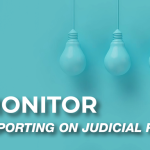
Number 2: Judicial Monitor – Monitoring and Reporting on Judicial Reforms
16/11/2024
N1.T2 – Ninth Attempt to Elect the President of the Supreme Court of Montenegro
20/11/2024N2.T1 – After four years, the Supreme Court of Montenegro finally has a President: Valentina Pavličić
HRA NEWSLETTER 2 – TOPIC 1
After nearly four years and eight unsuccessful attempts, on November 29, 2024, the Supreme Court of Montenegro appointed Valentina Pavličić as its new president.
Pavličić, a former representative of Montenegro at the European Court of Human Rights in Strasbourg, has also served as a judge in both the Basic Court and the Special Department of the High Court in Podgorica.
Her candidacy achieved unanimous support from all seven members of the Judicial Council present at the session.
Notably, the Acting President of the Supreme Court, Vesna Vučković—who was also a candidate—did not attend, while the Minister of Justice, Bojan Božović, exited prior to the vote, adhering to GRECO’s recommendations regarding ministerial non-interference with the judiciary. Subsequently, Judge Vučković resigned from her judicial position.
It is essential to note that the election of the Supreme Court President was a condition for Montenegro to secure nearly EUR 30 million in funding from the EU Growth Plan for the Western Balkans.
Since Vesna Medenica’s departure from the presidency in December 2020, the Court has functioned without a permanent leader. A total of eight competitions for the role have been held since January 2021, with no successful outcomes.
Prior to Pavličić’s election, two candidates, Miraš Radović—a former judge of both the Supreme and Constitutional Courts and Minister of Justice under the governments of Željko Šturanović and Milo Djukanović—and Vesna Vučković, had been presented to the Judicial Council but failed to achieve the necessary two-thirds majority.
Following a nearly five-month interval since the ninth competition was announced, the new president of the Supreme Court was finally elected.
In her address to the Judicial Council, Pavličić acknowledged the judiciary’s current challenges, citing data that reflects a significant backlog of cases.
“The time has come to demonstrate to our partners in Brussels that our institutions are robust. The Supreme Court will serve as the bedrock of our judicial system. There are numerous priorities and tasks ahead for my colleagues and me. We aim to effectively resolve the backlog of cases while managing the influx of new ones. Our objective is to contribute to the successful closure of Chapters 23 and 24 by 2026, and we will achieve this by ensuring timely adjudication”, stated President Pavličić.
She further emphasized that those who unjustly criticize judges and courts must recognize their actions as undermining the state.
“Political interference has been too pervasive, silencing the judiciary. I did not take this position to merely enjoy coffee at the office”, she asserted.
When questioned by a member of the Judicial Council regarding the implementation of vetting, President Pavličić stated that it serves as a necessary measure for societies seeking to dissociate from previous regimes. She emphasized that vetting ultimately hinges on a political decision.
“Commissions cannot implement vetting without foreign support; it is imperative that we engage our European partners, who have clear perspectives on this matter”, she asserted.
Pavličić’s election as President of the Supreme Court followed a successful vote at the General Session, where she secured ten votes. Her opponent, Miodrag Pešić, the President of the Administrative Court, received seven votes, while fellow Supreme Court judges Ana Vuković and Vesna Vučković garnered six votes each.
This pivotal election was facilitated by amendments to the Law on the Judicial Council and Judges. The revised legislation permits judges to vote for up to three candidates rather than just one. Additionally, recent amendments to the Rules of Procedure of the Supreme Court’s General Session effective October 18 stipulate that judges from the Supreme Court shall abstain from voting if candidates are presented from other courts.
Out of a possible 45 votes, given that there are 15 judges, the registered candidates collectively received 29 votes, accounting for 64% of total votes cast. Pavličić, the elected candidate, obtained 10 votes, or 22%. The number of judges who chose not to vote for any candidates during this election has not been disclosed.
HRA NEWSLETTER 2
- N2.T1 – After four years, the Supreme Court of Montenegro finally has a President: Valentina Pavličić
- N2.T2 – Indictment Control Phase for Tunnel Dug Beneath High Court
- N2.T3 – Judges’ Strike Postponed as Negotiations with Authorities Progress
- N2.T4 – HRA Survey: One-Third of Judges and Prosecutors Perceive Corruption in the Judiciary
- N2.T5 – Judicial Council Confronts Politicians, Opens Sessions to the Public
- N2.T6 – Judicial and Prosecutorial Councils Incomplete; No Response from Political System Committee
- N2.T7 – Who Will Remain to Adjudicate in the Special Department of the High Court in Podgorica?
- N2.BN – BRIEF NEWS





 English
English